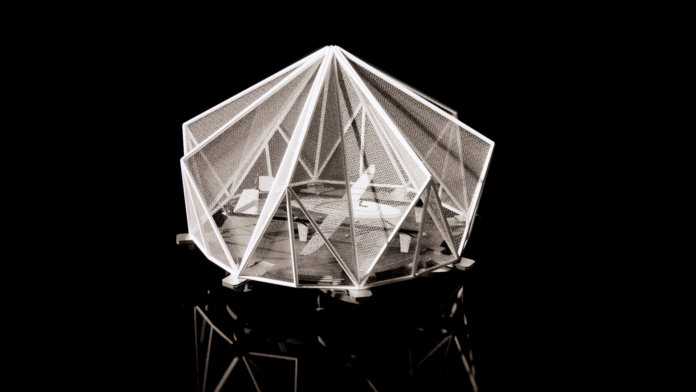Project CAELUS, a consortium of organisations including AGS Airports, NHS Scotland, University of Strathclyde and AtkinsRéalis, is due to start live flight trials for the UK’s first national distribution network using drones to transport essential medicines, blood, organs and other medical supplies throughout Scotland. The network, part of the UK Government Future Flight Challenge, will ensure critical medical supplies can be delivered more efficiently. It can also help to reduce waiting times for test results and, crucially, provide equity of care between urban and remote rural communities.
The ground-based infrastructure to support the network is being designed by AtkinsRéalis and the initial concepts for the landing pads have been revealed for the first time. The design is entirely unique, taking its cue from nature to create an origami-inspired structure made of strong, lightweight aluminium, with a lid which will open and close like the petals of a flower, says the press release.
Innovation and sustainability are at the heart of the design with the intention of making it off-grid by incorporating photo voltaic (PV) panels where possible, to generate the power required to operate its lid and re-charge the drone. And, due to the mobile and lightweight nature of the design, the unit will leave virtually no trace on the environment wherever it is placed, says AtkinsRéalis.
Chris Crombie, lead designer on the project for AtkinsRéalis said: “Project CAELUS has the potential to revolutionise how rural and remote communities receive vital supplies in future. The landing infrastructure is an important part of how the network can integrate with those communities. There are a number of considerations in terms of the practical function of this pad as it has to be able to fit into a van or on a trailer to transport it, so it needs to be lightweight. But at the same time it needs to be secure from the elements and strong enough for the job it’s designed for.”
The next stage in the development of the pad will be the fabrication of a working prototype which is due to be tested in real world conditions early in 2024.
Project CAELUS is part funded by Innovate UK’s Future Flight Challenge and has secured £7 million of funding to develop the network. The consortium brings together 16 partners including the University of Strathclyde, NATS and NHS Scotland.
For more information visit:




